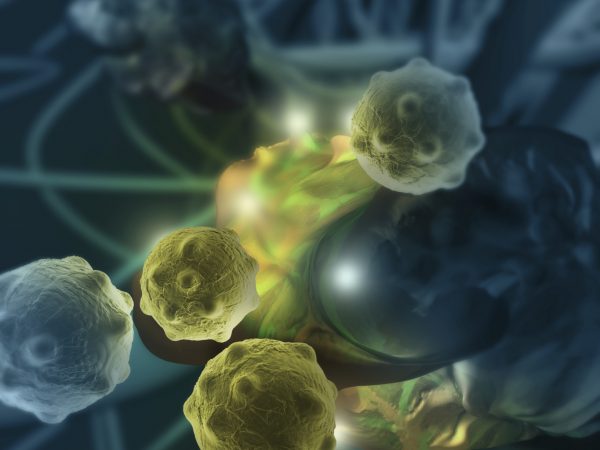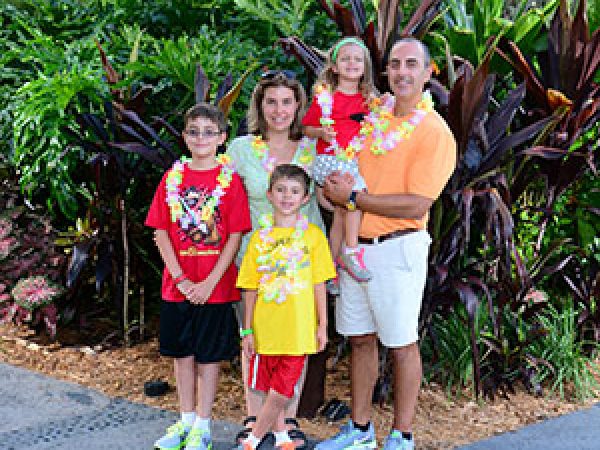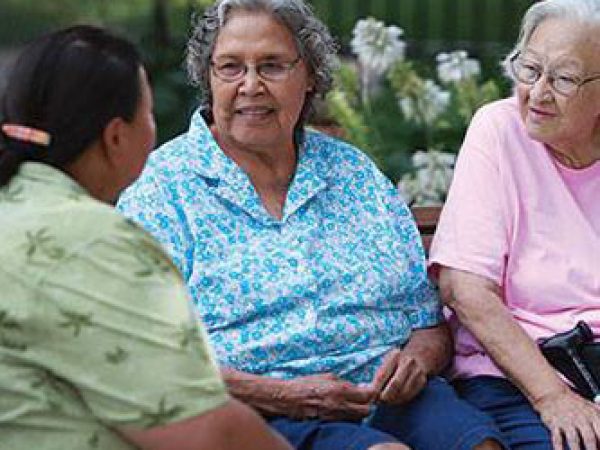Disparities Conference Unites Researchers, Patients, and Policymakers
As the 15th AACR Conference on The Science of Cancer Health Disparities in Racial/Ethnic Minorities and the Medically Underserved kicked off Friday afternoon, the keynote speakers embodied three important elements in the quest to end cancer health disparities.
Douglas R. Lowy, MD, FAACR, Acting Director of the National Cancer Institute (NCI), represented the policymakers, who hold significant power in the development of programs to ease the burden of cancer in underrepresented populations.
Wenora Johnson, MPA, provided a voice for the patients. Having survived three separate cancer diagnoses, she feels compelled to make sure scientists include patients as active partners in cancer research.
And Loïc Le Marchand, MD, PhD, an expert in epidemiology, shone a light on the biological underpinnings of cancer health disparities.
This confluence of voices reflects the multifactorial nature of disparities research. Through the course of the meeting, speakers and poster presenters will address additional aspects of cancer health disparities, such as structural racism, social determinants of health, clinical trial enrollment, and workforce equity and diversity.
Margaret Foti, PhD, MD (hc), chief executive officer of the American Association for Cancer Research (AACR), noted that when the Disparities meeting was initially conceived 20 years ago, it was scheduled every two years.
“We soon realized that this topic was so important that the meeting should take place every year,” she said. “Remarkable progress has been made against cancer. However, much more work needs to be done so that the benefits of this progress can extend to all.”
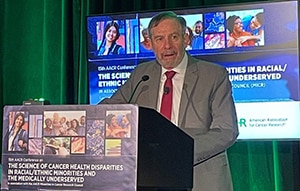
After meeting virtually for the past two years due to the COVID-19 pandemic, this year’s conference is taking place in Philadelphia, home to the AACR. The ongoing pandemic has raised Americans’ awareness of health disparities, as minority populations have been disproportionately affected, Lowy said.
Disparities in cancer are particularly frustrating in light of the significant progress that has been made against the disease, Lowy added. Thanks to research-driven development of new cancer treatments, as well as advances in screening, U.S. cancer mortality rates declined 27 percent between 2001 and 2020. And, as detailed in the AACR’s Cancer Disparities Progress Report 2022, the disparity in overall cancer mortality rates between Black and white Americans has narrowed from 26 percent in 2000 to 13 percent in 2019.
Lowy cautioned that the overall improvement masks some critical gaps. For example, Black women are twice as likely to die of uterine cancer than white women. The American Indian/Alaska Native population has not seen any improvement in cancer mortality. Black patients with lung cancer are much less likely than whites or Asians to have their tumors tested for genetic mutations, meaning they have less access to the targeted therapies that have dramatically reduced lung cancer deaths.
Ending these disparities requires a concerted effort from the government, Lowy said. This past week, the Biden administration revealed the latest details of its Cancer Moonshot, and Lowy said the NCI will support the Moonshot through four main goals: investing in the pipeline of new strategies and therapeutics for cancer prevention and treatment; expanding clinical trials to speed the evaluation of treatments in diverse populations; increasing implementation research to ensure equitable delivery of current and new standards of care; and boosting the diversity of the cancer research and care workforce.
“The return on investment will be enormous,” Lowy concluded.
The patients’ role in research
Wenora Johnson was diagnosed with stage 3b colorectal cancer in 2011. Genetic testing revealed that she has Lynch syndrome, an inherited condition that predisposes people to numerous types of cancer.
Within the next decade, Johnson would also be diagnosed with endometrial cancer and basal cell carcinoma. “I vowed to fight, and I have now fought three times, with winning results,” she said.
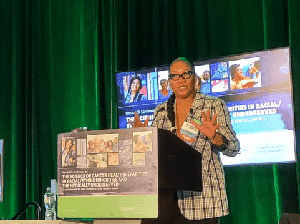
Johnson’s experiences with cancer led her to join the AACR’s Scientist↔Survivor Program (SSP), which unites cancer researchers with survivors and patient advocates to exchange information on key aspects of cancer research, survivorship, and public policy. She advocates on behalf of multiple patient organizations and encourages her fellow survivors to consider advocating in their own ways.
“Patient advocates can give back—pay it forward,” she said. “We can help develop patient-friendly consent forms and informational materials; help develop culturally appropriate methods of outreach; lobby for funding; share our stories and tell you what works and doesn’t work.”
Johnson said her advocacy has made her feel empowered as she continues to navigate her health care. She asked the researchers in the audience to seriously consider the role of advocates in their work.
“Researchers should avoid viewing advocates as symbolic requirements for their research studies. Instead, include them as active members of your research team,” she said.
Examining biological roots of disparities
While government statistics on cancer incidence and mortality reflect the overall U.S. population, examination of subgroups can reveal dramatically different experiences. The state of Hawaii, with an exceptionally diverse population, has provided fertile territory for Le Marchand to explore some of these varied cancer experiences.
Le Marchand, associate director for Community Outreach and Engagement, and Cancer Disparities, and full member of the Population Sciences in the Pacific Program (Cancer Epidemiology) at the University of Hawaii Cancer Center, was recognized with this year’s AACR Distinguished Lectureship on the Science of Cancer Health Disparities. In his talk, he discussed his work with the Multiethnic Cohort Study, which since 1993 has followed 215,000 residents of Hawaii and Los Angeles to study the development of cancer and other chronic diseases.
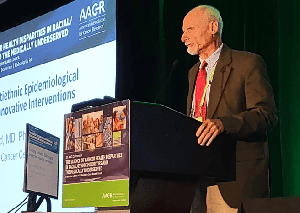
Le Marchand has observed that when comparing groups with similar smoking history, Blacks and Native Hawaiians are at higher risk of developing lung cancer than whites, Japanese Americans, and Latinos/Hispanics. Further research revealed distinct differences in the way these groups metabolize nicotine; Blacks metabolize nicotine faster, which prompts smokers to smoke more intensely and inhale more carcinogens. Conversely, Japanese Americans were shown to have impaired nicotine metabolism, leaving them less exposed to carcinogens.
Le Marchand said such research should help health professionals develop culturally tailored messages to encourage smoking cessation and other cancer preventive behaviors.
“Health inequities are a complex societal challenge. We have the obligation to translate our findings into interventions,” Le Marchand said.
Cancer Research Catalyst will provide full coverage of the Disparities meeting. You can follow the meeting on Twitter via the hashtag #AACRdisp22; follow the blog via #AACRBlog; and subscribe to the blog to make sure you never miss a post.

